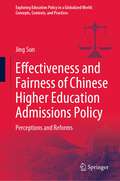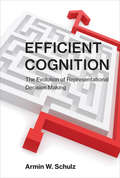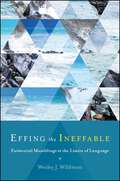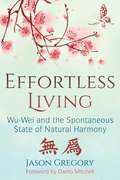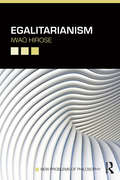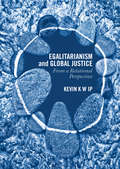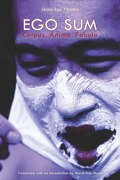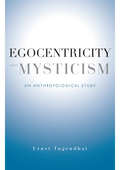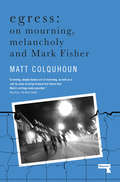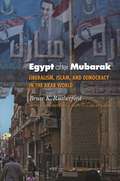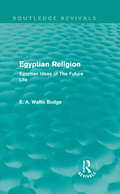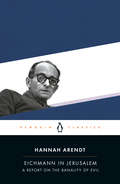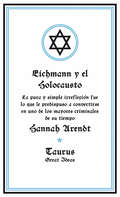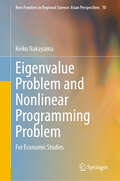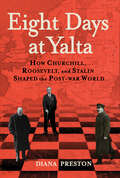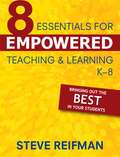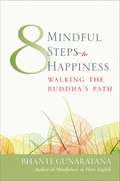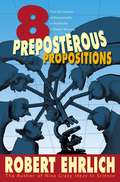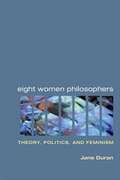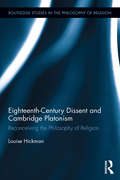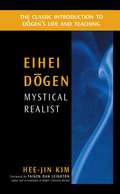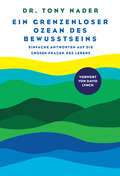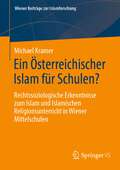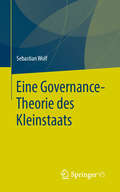- Table View
- List View
Effectiveness and Fairness of Chinese Higher Education Admissions Policy: Perceptions and Reforms (Exploring Education Policy in a Globalized World: Concepts, Contexts, and Practices)
by Jing SunThis book explores effectiveness and fairness in higher education admissions policy. It reviews the literatures from the 1940s until the 2010s and provides a theoretical framework. The book explores comparisons between this framework and the empirical data by interviewing policymakers from the Chinese government as well as admissions officer at Chinese universities. The book contributes to providing underlying theoretical foundation on the future Chinese higher education admissions policy reform. This book appeals to policymakers on all level of education, practitioners of admissions policy, researchers on education policy, and anyone who is interested in this field.
Efficient Cognition: The Evolution of Representational Decision Making
by Armin W. SchulzAn argument that representational decision making is more cognitively efficient, allowing an organism to adjust more easily to changes in the environment. Many organisms (including humans) make decisions by relying on mental representations. Not simply a reaction triggered by perception, representational decision making employs high-level, non-perceptual mental states with content to manage interactions with the environment. A person making a decision based on mental representations, for example, takes a step back from her perceptions at the time to assess the nature of the world she lives in. But why would organisms rely on representational decision making, and what evolutionary benefits does this reliance provide to the decision maker? In Efficient Cognition, Armin Schulz argues that representational decision making can be more cognitively efficient than non-representational decision making. Specifically, he shows that a key driver in the evolution of representational decision making is that mental representations can enable an organism to save cognitive resources and adjust more efficiently to changed environments. After laying out the foundations of his argument—clarifying the central questions, the characterization of representational decision making, and the relevance of an evidential form of evolutionary psychology—Schulz presents his account of the evolution of representational decision making and critically considers some of the existing accounts of the subject. He then applies his account to three open questions concerning the nature of representational decision making: the extendedness of decision making, and when we should expect cognition to extend into the environment; the specialization of decision making and the use of simple heuristics; and the psychological sources of altruistic behaviors.
Effing the Ineffable: Existential Mumblings at the Limits of Language
by Wesley J. WildmanIn Effing the Ineffable, Wesley J. Wildman confronts the human obsession with ultimate reality and our desire to conceive and speak of this reality through religious language, despite the seeming impossibility of doing so. Each chapter is a meditative essay on an aspect of life that, for most people, is fraught with special spiritual significance: dreaming, suffering, creating, slipping, balancing, eclipsing, loneliness, intensity, and bliss. These moments can inspire religious questioning and commitment, and, in extreme situations, drive us in search of ways to express what matters most to us. Drawing upon American pragmatist, Anglo-American analytic, and Continental traditions of philosophical theology, Wildman shows how, through direct description, religious symbolism, and phenomenological experience, the language games of religion become a means to attempt, and, in some sense, to accomplish this task.
Effortless Living: Wu-Wei and the Spontaneous State of Natural Harmony
by Damo Mitchell Jason GregoryA guide for achieving an enlightened mind through the art of non-doing • Details meditation practices, focused on stillness of the mind, along with Patanjali’s yoga methods to maintain a consciousness referred to as “being in the zone” • Builds on Taoist, Confucian, and Hindu principles along with scientific findings to support wu-wei--the art of non-doing, non-forcing--as a way of life • Explains how wu-wei practitioners cultivate intelligent spontaneity and effortless action to allow the natural harmony of the cosmos to prevail The practice of non-doing, non-forcing is an essential aspect of Taoism known as wu-wei. Attributed to the great sage Lao-tzu, the philosophy of wu-wei teaches you how to develop a natural state of consciousness not bound by thought or preconceived limitations. Experienced by the greatest artists, athletes, musicians, and writers, this heightened state of consciousness, referred to as “being in the zone,” is where intelligent spontaneity and effortless action flourish via a practice rooted in permitting the natural harmony of the cosmos to prevail. Merging Taoist philosophy, Hindu principles, and Confucianism along with scientific findings, Jason Gregory outlines the practice of wu-wei as a vehicle to realize our innate freedom, revealing that when we release our ego and allow life to unfold as it will, we align ourselves more closely with our goals and cultivate skill and mastery along the way. Equating “being in the zone” with a stillness of the mind, Gregory shares meditation practices coupled with yoga exercises from Patanjali that allow you to approach life with a mastery of acceptance, releasing deluded beliefs of how to achieve success that make your mind “sticky” and poised for conflict. The author shows how practicing wu-wei paradoxically empowers you to accomplish all that you desire by having no intention to do so, as well as allowing you to become receptive to nature’s blueprint for expressing beauty. Revealing wisdom utilized by renowned sages, artists, and athletes who have adapted “being in the zone” as a way of life, the author shows that wu-wei can yield a renewed sense of trust in many aspects of your daily life, making each day more effortless. As an avid wu-wei practitioner, he provides keen insight on how you, too, can experience the beauty of achieving an enlightened, effortless mind while reveling in the process of life’s unfolding.
Egalitarianism (New Problems of Philosophy)
by Iwao HiroseSome people are worse off than others. Does this fact give rise to moral concern? Egalitarianism claims that it does, for a wide array of reasons. It is one of the most important and hotly debated problems in moral and political philosophy, occupying a central place in the work of John Rawls, Thomas Nagel, G. A. Cohen and Derek Parfit. It also plays an important role in practical contexts such as the allocation of health care resources, the design of education and tax systems, and the pursuit of global justice. Egalitarianism is a superb introduction to the problem of contemporary egalitarian theories. It explains how rival theories of egalitarianism evaluate distributions of people’s well-being, and carefully assesses the theoretical structure of each theory. It also examines how egalitarian theories are applied to the distribution of health and health care, thus bringing a deceptively complex philosophical debate into clear focus. Beginning with a brief introduction to basic terminology, Iwao Hirose examines the following topics: Rawlsian egalitarianism luck egalitarianism telic egalitarianism prioritarianism sufficientarianism equality and time equality in health and health care. Including chapter summaries, annotated further reading and a glossary, this is an ideal starting point for anyone studying distributive justice for the first time, and will also be of interest to more advanced students and researchers in philosophy, economics, political theory, public policy, and public health.
Egalitarianism and Global Justice
by Kevin K. W. IpIn this book, Kevin Ip articulates and defends an egalitarian conception of global distributive justice grounded on the value of equality as a normative ideal of how human relations should be conducted. Arguing that relationships of equality, rather than those characterized by domination or exploitation, are a requirement for a just system, Ip spells out the real-world implications of this approach. Ip defends the ideal of equality against the diverse objections which have been brought to bear, and the responsibilities we bear in our aspirations towards global justice.
Ego Sum: Corpus, Anima, Fabula
by Jean-Luc NancyFirst published in 1979 but never available in English until now, Ego Sum challenges, through a careful and unprecedented reading of Descartes’s writings, the picture of Descartes as the father of modern philosophy: the thinker who founded the edifice of knowledge on the absolute self-certainty of a Subject fully transparent to itself. While other theoretical discourses, such as psychoanalysis, have also attempted to subvert this Subject, Nancy shows how they always inadvertently reconstituted the Subject they were trying to leave behind.Nancy’s wager is that, at the moment of modern subjectivity’s founding, a foundation that always already included all the possibilities of its own exhaustion, another thought of “the subject” is possible. By paying attention to the mode of presentation of Descartes’s subject, to the masks, portraits, feints, and fables thatpopulate his writings, Jean-Luc Nancy shows how Descartes’s ego is not the Subject of metaphysics but a mouth that spaces itself out and distinguishes itself.
Egocentricity and Mysticism: An Anthropological Study
by Mario Wenning Ernst TugendhatErnst Tugendhat sees mysticism as a response to a deep need for peace of mind. We experience this need in connection to our discursive practices that relate us to and differentiate us from one another and the world we inhabit for a short period of time. This condition, Tugendhat shows, prompts us to "step back" from our egocentric concerns. Mysticism satisfies our need for self-transcendence born from the tensions arising from language, social interaction, and mortality.
Egocentricity and Mysticism: An Anthropological Study
by Ernst TugendhatIn Egocentricity and Mysticism, Ernst Tugendhat casts mysticism as an innate facet of what it means to be human—a response to an existential need for peace of mind. This need is created by our discursive practices, which serve to differentiate us from one another and privilege our respective first-person standpoints. Emphasizing the first person fuels a desire for mysticism, which builds knowledge of what binds us together and connects us to the world. Any intellectual pursuit that prompts us to "step back" from our egocentric concerns harbors a mystic kernel that manifests as a sense of awe, wonder, and gratitude. Philosophy, the natural sciences, and mathematics all engender forms of mystical experience as profound as any produced by meditation and asceticism. One of the most widely discussed books by a German philosopher in decades, Egocentricity and Mysticism is a philosophical milestone that clarifies in groundbreaking ways our relationship to language, social interaction, and mortality.
Egress: On Mourning, Melancholy and the Fisher-Function
by Matt ColquhounEgress is the first book to consider the legacy and work of the writer, cultural critic and cult academic Mark Fisher. Narrated in orbit of his death as experienced by a community of friends and students in 2017, it analyses Fisher&’s philosophical trajectory, from his days as a PhD student at the University of Warwick to the development of his unfinished book on Acid Communism. Taking the word &“egress&” as its starting point—a word used by Fisher in his book The Weird and the Eerie to describe an escape from present circumstances as experiences by the characters in countless examples of weird fiction—Egress consider the politics of death and community in a way that is indebted to Fisher&’s own forms of cultural criticism, ruminating on personal experience in the hope of making it productively impersonal.
Egypt after Mubarak: Liberalism, Islam, and Democracy in the Arab World (Princeton Studies in Muslim Politics #48)
by Bruce K. RutherfordWhich way will Egypt go now that Husni Mubarak's authoritarian regime has been swept from power? Will it become an Islamic theocracy similar to Iran? Will it embrace Western-style liberalism and democracy? Egypt after Mubarak reveals that Egypt's secularists and Islamists may yet navigate a middle path that results in a uniquely Islamic form of liberalism and, perhaps, democracy. Bruce Rutherford draws on in-depth interviews with Egyptian judges, lawyers, Islamic activists, politicians, and businesspeople. He utilizes major court rulings, political documents of the Muslim Brotherhood, and the writings of Egypt's leading contemporary Islamic thinkers. Rutherford demonstrates that, in post-Mubarak Egypt, progress toward liberalism and democracy is likely to be slow. Essential reading on a subject of global importance, this edition includes a new introduction by Rutherford that takes stock of the Arab Spring and the Muslim Brotherhood's victories in the 2011-2012 elections.
Egyptian Religion: Egyptian Ideas of The Future Life (Routledge Revivals)
by E.A. Wallis BudgeSir E. A. Wallis Budge (1857-1934) was Keeper of the British Museum’s department of oriental antiquities from 1894 until his retirement in 1924. Carrying out many missions to Egypt in search of ancient objects, Budge was hugely successful in collecting papyri, statues and other artefacts for the trustees of the British Museum: numbering into the thousands and of great cultural and historical significance. Budge published well over 100 monographs, which shaped the development of future scholarship and are still of great academic value today, dealing with subjects such as Egyptian religion, history and literature. First published in 1899 as part of the Egypt and Chaldaea series, Egyptian Religion explores the principal ideas and beliefs held by the ancient Egyptians with regard to the doctrine of the resurrection and the future life. Although no systematic account dealing solely with this doctrine has been discovered, the Book of the Dead and various other religious texts from which this work is derived reflect ancient Egyptian beliefs, ideals and superstitions. Wallis Budge explores the Gods of the Egyptians and the themes of resurrection and immorality in a classic work, of great significance to students and scholars with an interest in ancient Egyptian and Middle Eastern history and religion.
Eichmann in Jerusalem: A Report on the Banality of Evil (Palabra En El Tiempo Ser. #Vol. 271)
by Hannah ArendtOriginally appearing as a series of articles in The New Yorker, Hannah Arendt’s authoritative and stunning report on the trial of Nazi leader Adolf Eichmann sparked a flurry of debate upon its publication. This revised edition includes material that came to light after the trial, as well as Arendt’s postscript directly addressing the controversy that arose over her account. A major journalistic triumph by an intellectual of singular influence, Eichmann in Jerusalem is as shocking as it is informative-an unflinching look at one of the most unsettling (and unsettled) issues of the Twentieth Century. This edition includes an introduction by Amos Elon. .
Eichmann y el Holocausto (Serie Great Ideas #Volumen 14)
by Hannah ArendtIdeas que han cambiado el mundo. A lo largo de la historia, algunos libros han cambiado el mundo. Han transformado la manera en que nos vemos a nosotros mismos y a los demás. Han inspirado el debate, la discordia, la guerra y la revolución. Han iluminado, indignado, provocado y consolado. Han enriquecido vidas, y también las han destruido. Taurus publica las obras de los grandes pensadores, pioneros, radicales y visionarios cuyas ideas sacudieron la civilización y nos impulsaron a ser quienes somos. Inspirada por el juicio a un burócrata que contribuyó a provocar el Holocausto, esta obra fundamental sobre la banalidad del mal asombró al mundo con su análisis de la ceguera moral de un régimen y de la insistencia de un hombre en ser absuelto de toda culpa porque «sólo cumplía órdenes». Comentarios sobre la colección Great Ideas: «De veras que la edición es primorosa y pocas veces contenido y continente pueden encontrarse mejor ensamblados y unidos. ¡Qué portadas! Para enmarcar. [...] Ante las Great Ideas, solo cabe quitarse el sombrero. ¡Chapeau!»ABC «Taurus propone un doble envite con este lanzamiento. Por un lado aumenta su compromiso con el ensayo; por otro, recupera el gusto por la estética. A los volúmenes se les ha proporcionado una portada delicada y cuidada (copian el original británico) que invita a la lectura.»La Razón «Un fenómeno editorial.»The Guardian «Aparte de los contenidos, en general muy bien elegidos, son tan bonitos que si los ven seguro que cae alguno.»El País «Ideas revolucionarias, crónicas de exploraciones, pensamientos radicales... vuelven a la vida en estas cuidadísimas ediciones, muy atractivas para nuevos lectores.»Mujer Hoy «Grandes ideas bien envueltas. De Cicerón a Darwin, esta colección entra por los ojos.»Rolling Stone «Original y bella iniciativa la emprendida por Taurus con su colección Great Ideas.»Cambio 16 «Hay libros inmortales, libros únicos que contienen pensamientos y reflexiones capaces de cambiar el mundo, tesoros en miniatura reagrupados en la colección Great ideas.»Diario de León Comentarios sobre la colección Great Ideas:«De veras que la edición es primorosa y pocas veces contenido y continente pueden encontrarse mejor ensamblados y unidos. ¡Qué portadas! Para enmarcar. [...] Ante las Great Ideas, solo cabe quitarse el sombrero. ¡Chapeau!»ABC «Taurus propone un doble envite con este lanzamiento. Por un lado aumenta su compromiso con el ensayo; por otro, recupera el gusto por la estética. A los volúmenes se les ha proporcionado una portada delicada y cuidada (copian el original británico) que invita a la lectura.»La Razón «Un fenómeno editorial.»The Guardian «Aparte de los contenidos, en general muy bien elegidos, son tan bonitos que si los ven seguro que cae alguno.»El País «Ideas revolucionarias, crónicas de exploraciones, pensamientos radicales... vuelven a la vida en estas cuidadísimas ediciones, muy atractivas para nuevos lectores.»Mujer Hoy «Grandes ideas bien envueltas. De Cicerón a Darwin, esta colección entra por los ojos.»Rolling Stone «Original y bella iniciativa la emprendida por Taurus con su colección Great Ideas.»Cambio 16 «Hay libros inmortales, libros únicos que contienen pensamientos y reflexiones capaces de cambiar el mundo, tesoros en miniatura reagrupados en la colección Great ideas.»Diario de León
Eigenvalue Problem and Nonlinear Programming Problem: For Economic Studies (New Frontiers in Regional Science: Asian Perspectives #70)
by Keiko NakayamaThis book focuses on the Frobenius theorem regarding a nonlinear simultaneous system. The Frobenius theorem is well known as a condition for a linear simultaneous system’s having a nonnegative solution. Generally, however, the condition of a simultaneous system, including a non-linear system’s having a nonnegative solution, is hardly discussed at all. This book, therefore, extends the conventional Frobenius theorem for nonlinear simultaneous systems for economic analysis. Almost all static optimization problems in economics involve nonlinear programing. Theoretical models in economics are described in the form of a simultaneous system resulting from the rational optimization behavior of households and enterprises. On the other hand, rational optimization behavior of households and enterprises is, mathematically speaking, expressed as nonlinear programing. For this reason it is important to understand the meaning of nonlinear programing. Because this book includes explanations of the relations among various restrictions in a nonlinear programing systematically and clearly, this book is suitable for students in graduate school programs in economics.
Eight Days at Yalta: How Churchill, Roosevelt, and Stalin Shaped the Post-war World
by Diana PrestonThe authoritative history of the pivotal conference between Allied leaders at the close of WWII, based on revealing firsthand accounts.Crimea, 1945. As the last battles of WWII were fought, US President Franklin Roosevelt, British Prime Minister Winston Churchill, and Soviet Premier Joseph Stalin—the so-called “Big Three” —met in the Crimean resort town of Yalta. Over eight days of bargaining, bombast, and intermittent bonhomie, they decided on the endgame of the war against Nazi Germany and how the defeated nation should be governed. They also worked out the constitution of the nascent United Nations; the price of Soviet entry into the war against Japan; the new borders of Poland; and spheres of influence across Eastern Europe, the Balkans, and Greece.Drawing on the lively accounts of those who were there—from the leaders and advisors such as Averell Harriman, Anthony Eden, and Andrei Gromyko, to Churchill’s secretary Marian Holmes and FDR’s daughter Anna Boettiger—Diana Preston has crafted a masterful chronicle of the conference that created the post-war world.Who “won” Yalta has been debated ever since. After Germany’s surrender, Churchill wrote to the new president, Harry Truman, of “an iron curtain” that was now “drawn upon [the Soviets’] front.” Knowing his troops controlled eastern Europe, Stalin’s judgment in April 1945 thus speaks volumes: “Whoever occupies a territory also imposes on it his own social system.”
Eight Essentials for Empowered Teaching and Learning, K-8: Bringing Out the Best in Your Students
by Steve ReifmanInspirational and practical, this book focuses on the quality of teaching and learning in elementary and middle school classrooms and helps teachers and students find more joy, satisfaction, and meaning in their work.Experienced teacher Steve Reifman defines a quality classroom in reader-friendly terms, explains how to measure quality, and covers the conditions under which all students are empowered to reach their full potential. The author synthesizes key concepts from the fields of education, psychology, management, and personal growth to arrive at the eight essential elements of teaching, including realistic goal setting, assessment-oriented instruction, parent involvement, and teacher leadership. Written in an engaging personal voice and drawing upon the work of experts such as Stephen Covey, Howard Gardner, Ted Sizer, William Glasser, Carol Ann Tomlinson, Alfie Kohn, and Alan Blakenstein, this resourcePromotes student motivation and a classroom environment of trust and respectBuild higher-level thinking and group problem solving into the curriculumPresents classroom applications, examples, anecdotes, and reproducible pagesFeatures ideas from practicing teaching for putting these essential ideas to work in the classroomEight Essentials for Empowered Teaching and Learning, K-8 motivates student teachers, beginning teachers, and veteran educators to become the most effective instructors they can be and achieve the best learning outcomes possible for their students.
Eight Mindful Steps to Happiness: Walking the Buddha's Path
by Bhante Henepola GunaratanaIn the same engaging style that has endeared him to readers of Mindfulness In Plain English, Bhante Gunaratana delves deeply into each step of the Buddha's most profound teaching on bringing an end to suffering: the noble eightfold path. With generous and specific advice, Eight Mindful Steps to Happiness offers skillful ways to handle anger, to find right livelihood, and to cultivate loving-friendliness in relationships with parents, children, and partners, as well as tools to overcome all the mental hindrances that prevent happiness. Whether you are an experienced meditator or someone who's only just beginning, this gentle and down-to-earth guide will help you bring the heart of the Buddha's teachings into every aspect of your life. A Foreword Magazine Book of the Year Awards finalist (Spirituality/Inspirational).
Eight Preposterous Propositions: From the Genetics of Homosexuality to the Benefits of Global Warming
by Robert EhrlichPlacebo cures. Global warming. Extraterrestrial life. Psychokinesis. In a time when scientific claims can sound as strange as science fiction--and can have a profound effect on individual life or public policy--assessing the merits of a far-out, supposedly scientific idea can be as difficult as it is urgent. Into the breach between helpless gullibility and unyielding skepticism steps physicist Robert Ehrlich, with an indispensable guide to making sense of "scientific" claims. A series of case studies of some of the most controversial (and for the judging public, deeply vexing) topics in the natural and social sciences, Ehrlich's book serves as a primer for evaluating the evidence for the sort of strange-sounding ideas that can shape our lives. A much-anticipated follow-up to his popular Nine Crazy Ideas in Science, this book takes up issues close to readers' everyday reality--issues such as global warming, the dangers of cholesterol, and the effectiveness of placebos--as well as questions that resonate through (and beyond) civic life: Is intelligent design a scientific alternative to evolution? Is homosexuality primarily innate? Are people getting smarter or dumber? In each case, Ehrlich shows readers how to use the tools of science to judge the accuracy of strange ideas and the trustworthiness of ubiquitous "experts." As entertaining as it is instructive, his book will make the work of living wisely a bit easier and more reliable for scientists and nonscientists alike.
Eight Women Philosophers: Theory, Politics, and Feminism
by Jane DuranSpanning over nine hundred years, Eight Women Philosophers is the first singly-authored work to trace the themes of standard philosophical theorizing and feminist thought across women philosophers in the Western tradition. Jane Duran has crafted a comprehensive overview of eight women philosophers--Hildegard of Bingen, Anne Conway, Mary Astell, Mary Wollstonecraft, Harriet Taylor Mill, Edith Stein, Simone Weil, and Simone de Beauvoir--that underscores the profound and continuing significance of these thinkers for contemporary scholars. Duran devotes one chapter to each philosopher and provides a sustained critical analysis of her work, utilizing aspects of Continental theory, poststructuralist theory, and literary theory. She situates each philosopher within her respective era and in relation to her intellectual contemporaries, and specifically addresses the contributions each has made to major areas such as metaphysics/epistemology, theory of value, and feminist theory. She affirms the viability and importance of recovering these women's overlooked work and provides a powerful answer to the question of why the rubric "women philosophers" remains so valuable.
Eighteenth-Century Dissent and Cambridge Platonism: Reconceiving the Philosophy of Religion (Routledge Studies in the Philosophy of Religion)
by Louise HickmanEighteenth-Century Dissent and Cambridge Platonism identifies an ethically and politically engaged philosophy of religion in eighteenth century Rational Dissent, particularly in the work of Richard Price (1723-1791), and in the radical thought of Mary Wollstonecraft. It traces their ethico-political account of reason, natural theology and human freedom back to seventeenth century Cambridge Platonism and thereby shows how popular histories of the philosophy of religion in modernity have been over-determined both by analytic philosophy of religion and by its critics. The eighteenth century has typically been portrayed as an age of reason, defined as a project of rationalism, liberalism and increasing secularisation, leading inevitably to nihilism and the collapse of modernity. Within this narrative, the Rational Dissenters have been accused of being the culmination of eighteenth-century rationalism in Britain, epitomising the philosophy of modernity. This book challenges this reading of history by highlighting the importance of teleology, deiformity, the immutability of goodness and the divinity of reason within the tradition of Rational Dissent, and it demonstrates that the philosophy and ethics of both Price and Wollstonecraft are profoundly theological. Price’s philosophy of political liberty, and Wollstonecraft’s feminism, both grounded in a Platonic conception of freedom, are perfectionist and radical rather than liberal. This has important implications for understanding the political nature of eighteenth-century philosophical theology: these thinkers represent not so much a shaking off of religion by secular rationality but a challenge to religious and political hegemony. By distinguishing Price and Wollstonecraft from other forms of rationalism including deism and Socinianism, this book takes issue with the popular division of eighteenth-century philosophy into rationalistic and empirical strands and, through considering the legacy of Cambridge Platonism, draws attention to an alternative philosophy of religion that lies between both empiricism and discursive inference.
Eihei Dogen: Mystical Realist
by Taigen Dan Leighton Hee-Jin KimEihei Dogen, the founder of the Japanese branch of the Soto Zen Buddhist school, is considered one of the world's most remarkable religious philosophers. Eihei Dogen: Mystical Realist is a comprehensive introduction to the genius of this brilliant thinker. This thirteenth-century figure has much to teach us all and the questions that drove him have always been at the heart of Buddhist practice. At the age of seven, in 1207, Dogen lost his mother, who at her death earnestly asked him to become a monastic to seek the truth of Buddhism. We are told that in the midst of profound grief, Dogen experienced the impermanence of all things as he watched the incense smoke ascending at his mother's funeral service. This left an indelible impression upon the young Dogen; later, he would emphasize time and again the intimate relationship between the desire for enlightenment and the awareness of impermanence. His way of life would not be a sentimental flight from, but a compassionate understanding of, the intolerable reality of existence. At age 13, Dogen received ordination at Mt. Hiei. And yet, a question arose: "As I study both the exoteric and the esoteric schools of Buddhism, they maintain that human beings are endowed with Dharma-nature by birth. If this is the case, why did the buddhas of all ages - undoubtedly in possession of enlightenment - find it necessary to seek enlightenment and engage in spiritual practice?" When it became clear that no one on Mt. Hiei could give a satisfactory answer to this spiritual problem, he sought elsewhere, eventually making the treacherous journey to China. This was the true beginning of a life of relentless questioning, practice, and teaching - an immensely inspiring contribution to the Buddhadharma. As you might imagine, a book as ambitious as Eihei Dogen: Mystical Realist has to be both academically rigorous and eminently readable to succeed. Professor Hee-Jim Kim's work is indeed both.
Ein grenzenloser ozean des bewusstseins
by Dr. Tony NaderEinfache antworten auf die großen fragen des lebens. Vorwort von David Lynch. «In diesem wegweisenden Buch stellt Dr. Tony Nader Ideen vor, die die Welt verändern können. Er gibt bahnbrechende Antworten auf Fragen, die seit jeher Philosophen und Wissenschaftler gleichermaßen fasziniert und beschäftigt haben. Was ist Bewusstsein? Sind wir frei? Wie können wir das Beste aus unserem Leben machen? Was können wir tun, damit sich unsere Wünsche erfüllen? Wie können wir Frieden und Harmonie unter Völkern und Nationen schaffen? Er bietet Antworten an, basierend auf einem einfachen zugrunde liegenden Paradigma, das Geist, Körper und Umgebung in einem Ozean reinen Seins, reinen Bewusstseins, vereint. Dieses Buch ist ein Muss für all diejenigen, die Antworten suchen auf Fragen nach den großen Geheimnissen des Lebens, nach der absoluten und letztgültigen Wahrheit.»David Lynch «Ich möchte, dass jeder weiß, was Bewusstsein ist und wie man es entwickelt, sodass jeder sich des vollen Potenzials des individuellen und sozialen Lebens erfreuen kann.»Dr. Tony Nader
Ein Österreichischer Islam für Schulen?: Rechtssoziologische Erkenntnisse zum Islam und Islamischen Religionsunterricht in Wiener Mittelschulen (Wiener Beiträge zur Islamforschung)
by Michael KramerDiese Publikation handelt von der Beziehung zwischen dem Staat und dem Islam im allgemein-politischen und im schulischen Kontext, wobei der Islam neben anderen islamischen Institutionen in erster Linie von der Islamischen Glaubensgemeinschaft in Österreich (IGGÖ) vertreten wird. Der IGGÖ – ebenso wie anderen Kirchen und Religionsgesellschaften (KuR) – werden im österreichischen Religionsrechtssystem weitreichende Autonomierechte eingeräumt, vor allem in der Schule in Form eines konfessionellen Religionsunterrichts (RU). Zur Erforschung dieser Beziehung in der Schule wird ein rechts- und politikwissenschaftlicher Blick auf die rechtlichen Rahmenbedingungen und die soziale Wirklichkeit des Islams und des RU der IGGÖ (IRU) in Wiener Mittelschulen geworfen. Konsequenterweise wird auch auf die verschiedenen involvierten Akteur*innen geblickt, insb. auf muslimische Schüler*innen und Eltern, Religionslehrer*innen, Fachinspektor*innen und sonstige Autoritäten der IGGÖ sowie Schuldirektor*innen, Bildungsdirektionen und das Bildungsministerium. Dafür wurden im Rahmen einer qualitativen Sozialforschung sieben (Schul-)Autoritäten der IGGÖ (IGGÖ-SA) als ‚Vertreter*innen des Islams‘ und sechs Wiener Mittelschuldirektor*innen (MSD) als ‚staatliche Vertreter*innen‘ interviewt. Die Interviews verfolgten drei Zwecke: 1) die Ergründung negativer rechtlicher, politischer, gesellschaftlicher und religionsgesellschaftlicher Einflussfaktoren auf die allgemeine Beziehung zwischen dem Staat und dem Islam bzw. der IGGÖ (und den Muslim*innen); 2) die Erhebung von Herausforderungen, Spannungen und Konflikten sowie Idealvorstellungen in der schulpolitischen, -bürokratischen, -organisatorischen, individuellen und korporativen Beziehungsdimension, sowie 3) die Erforschung von persönlichen Einstellungen und Haltungen von IGGÖ-SA und MSD zum Islam und dem IRU in der Schule sowie – vonseiten der IGGÖ-SA – zum Staat und der Gesellschaft. Während der dritte Zweck in dieser Publikation nur eine untergeordnete Rolle einnimmt, liegt das Hauptaugenmerk auf den abstrahierten Spannungsfeldern des 'gelebten Rechts' im Sinne der sozialen Wirklichkeit in den entsprechenden Beziehungsdimensionen, die in einer rechtssoziologischen Analyse dem normativem Recht gegenübergestellt und entlang idealtypischer Einstellungen und Haltungen auf Ursachen, Wirkungen und Lösungen untersucht werden. Die Analysethemen umfassen mitunter die Einbeziehung von Fachinspektor*innen für Religion in die Bildungsdirektionen, den Streit über die Abkürzung der IGGÖ für die Eintragung in Zeugnisse, die Schwierigkeiten in der Organisation mit dem RU, das (religiöse) Verhalten muslimischer Schüler*innen und Eltern in der Schule sowie die Grenzen der Lehre im IRU im Rahmen der staatsbürgerlichen Erziehung. Diesbezügliche Idealvorstellungen zu den Herausforderungen ermöglichen abschließend aus einer sozialintegrativen und pluralistischer Perspektive der IGGÖ-SA die Konturierung eines Österreichischen Islams bzw. eines idealtypischen IRU.
Eine Governance-Theorie des Kleinstaats
by Sebastian WolfDieses Werk untersucht außergewöhnliche Regelungsmechanismen in Gesetzgebungsprozessen in Liechtenstein wie z. B. übergroße parlamentarische Mehrheiten, ein schwacher Koalition-Opposition-Dualismus und geringe Fraktionsgeschlossenheit. Zur Analyse wird ein theoretischer Rahmen aus Kleinstaatentheorie und Governancetheorie entwickelt und im Rahmen einer explorativen Fallstudie getestet. Das Buch trägt insbesondere zum besseren Verständnis des politischen Systems Liechtensteins und zur Weiterentwicklung der sozialwissenschaftlichen Kleinstaatentheorie bei.
